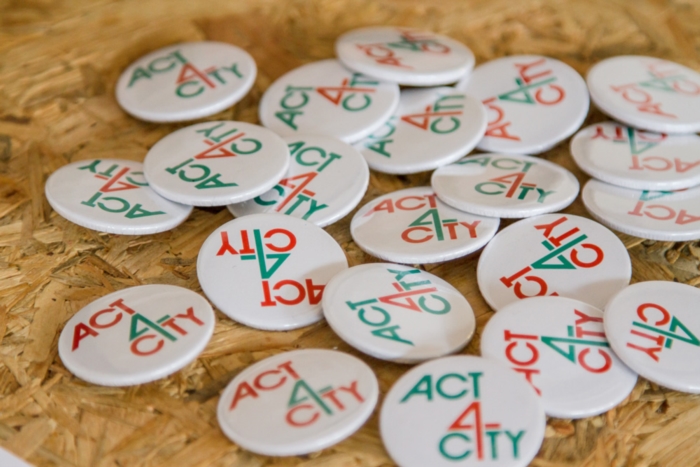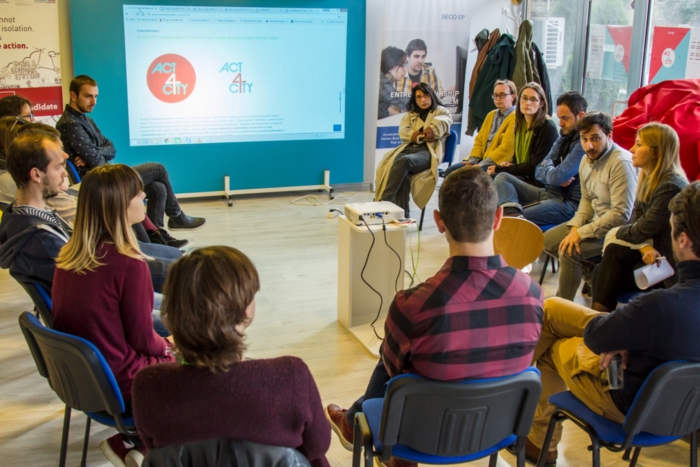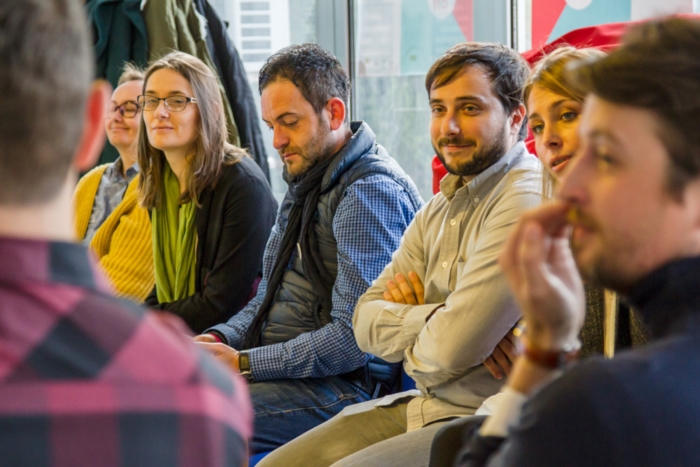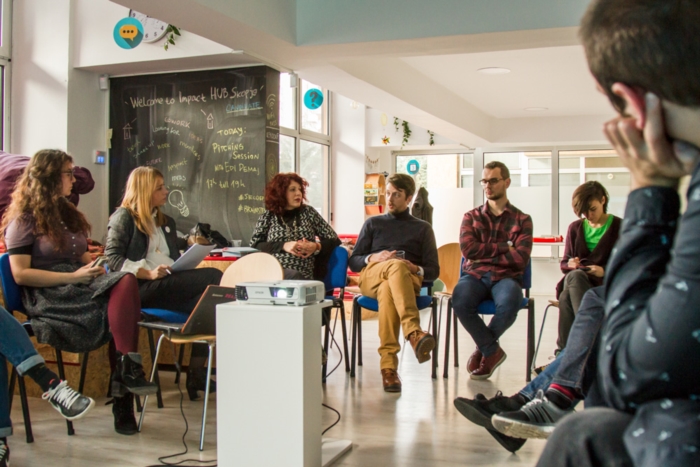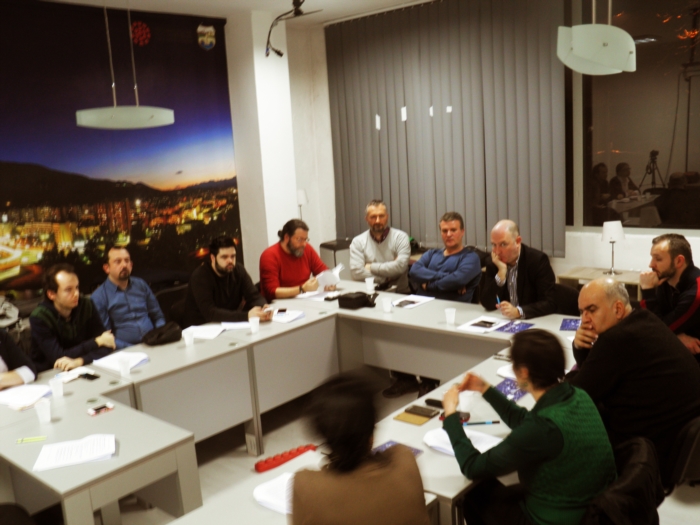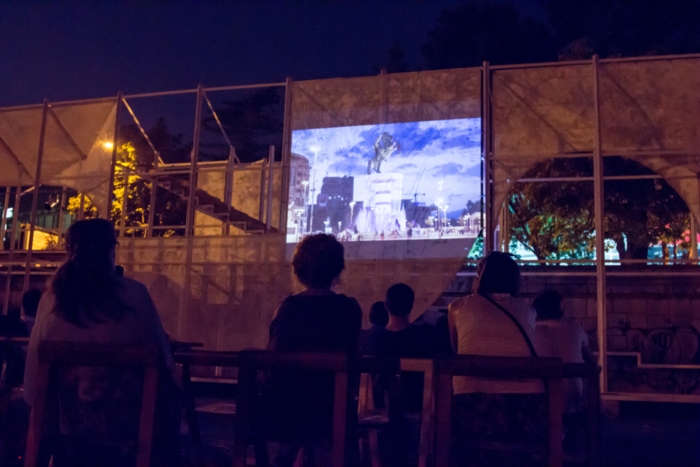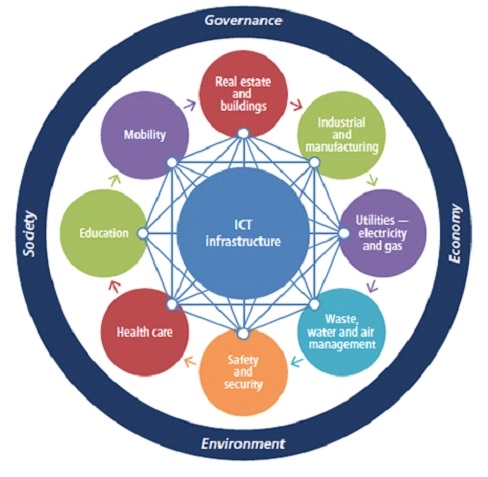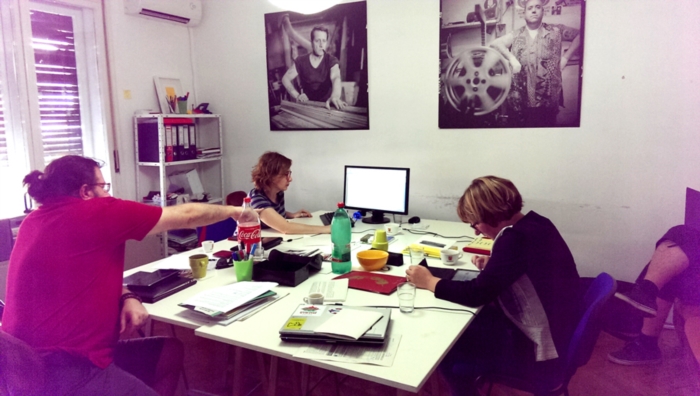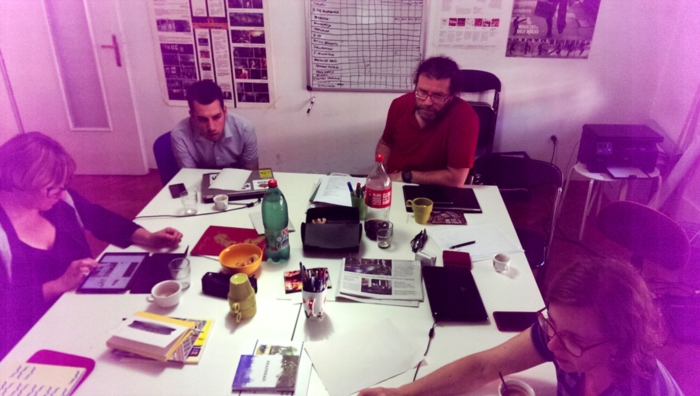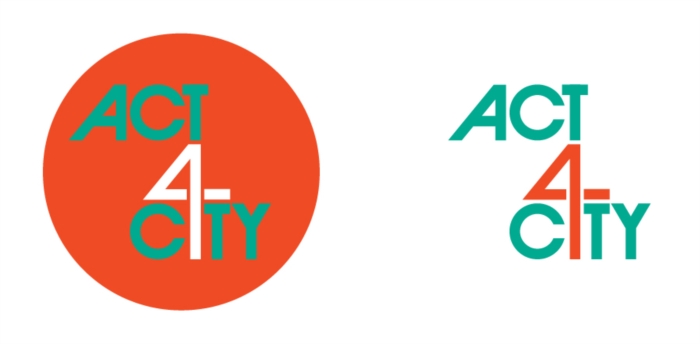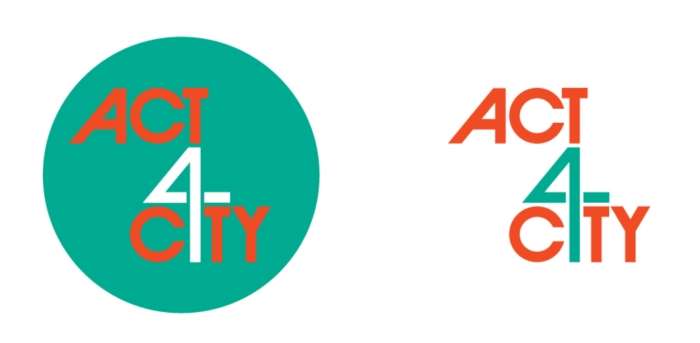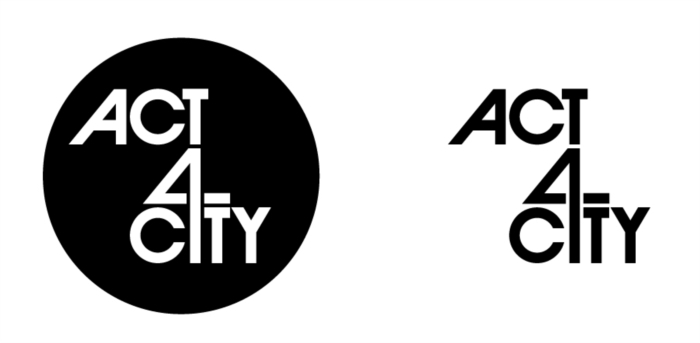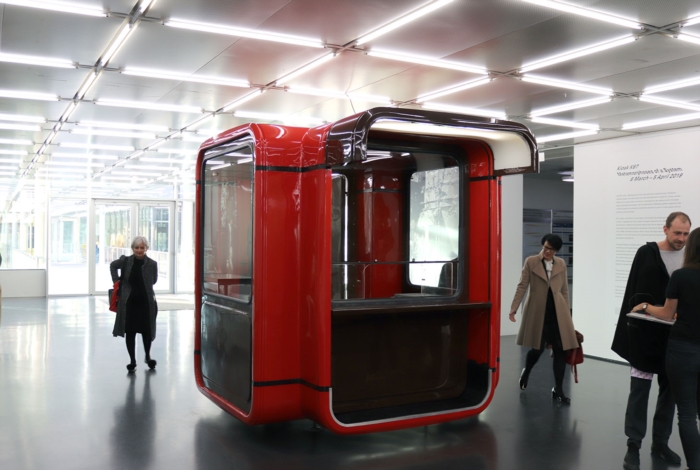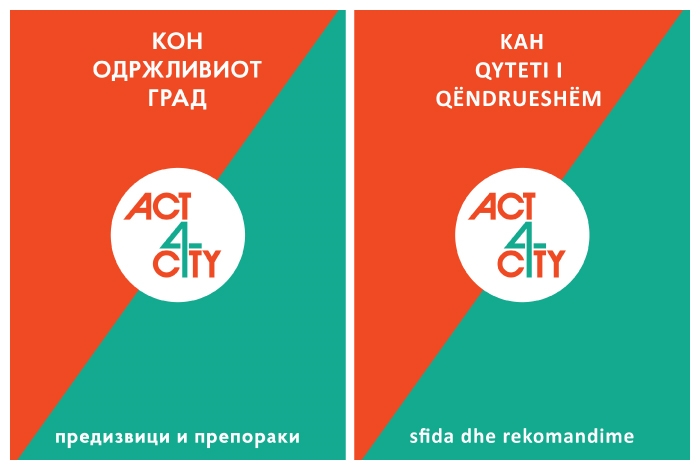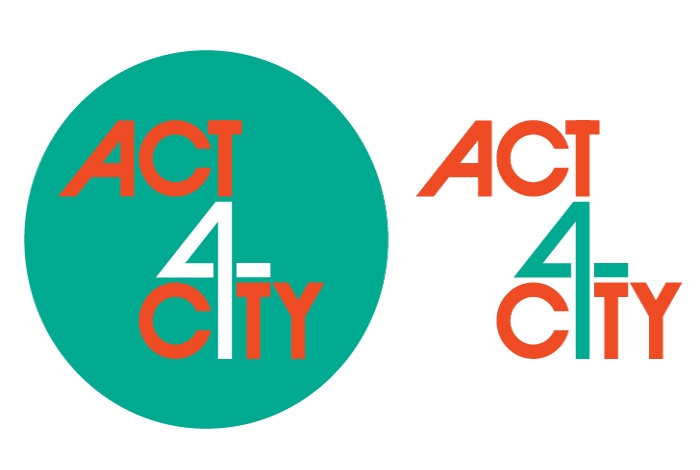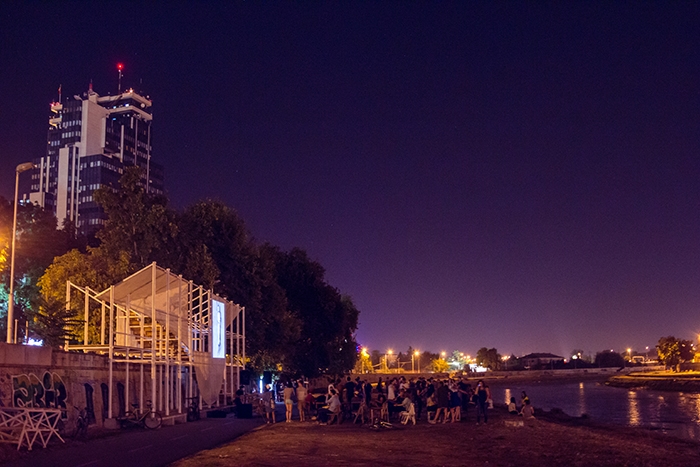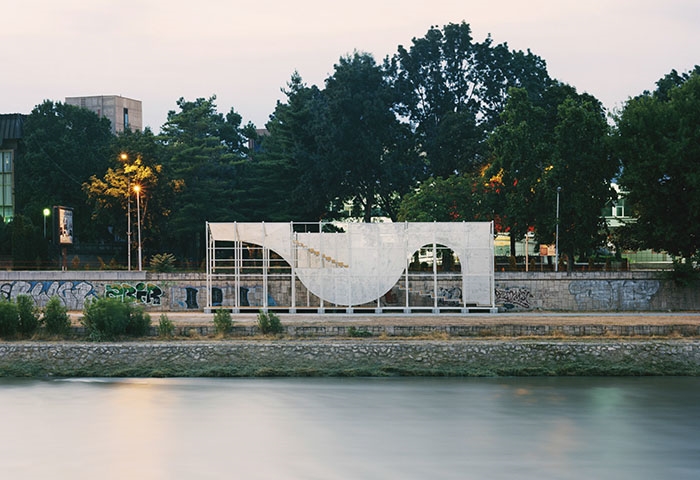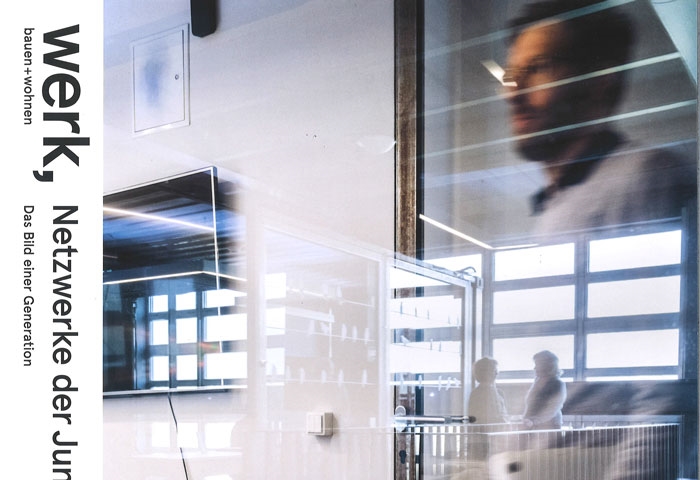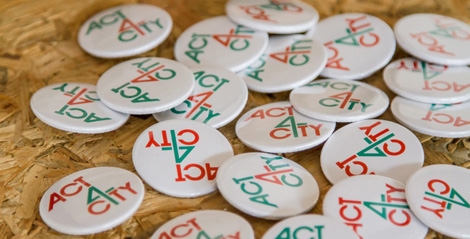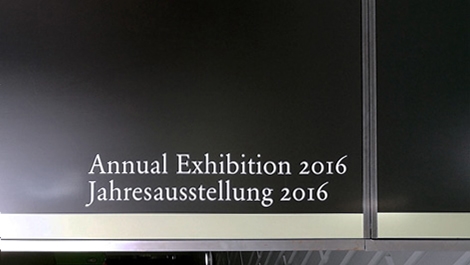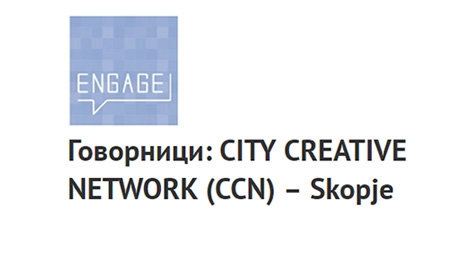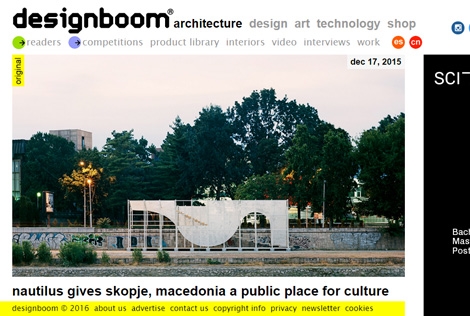Round Table in Skopje
CITY CREATIVE NETWORK (CCN)
Independent Culture for Sustainable Development of Balkan Cities:
Possibilities, Experiences, Proposals
Saturday, 05.11.2016, 14 - 17h., HUB Skopje, Skopje
The discussion started with a short introduction of the project ACT4CITY and the sustainable urban development of the Balkan cities, problematics that this project treats. The short introduction of the project and its regional collaboration were followed by presentation of the video How Skopje 2014 Ate the Urban Commons made by local NGO Freedom Square that showed the local context and the circumstances in which the Macedonian civil society organizations and independent scene in general operate. That led the discussion towards highlighting the major problems in terms of sustainability, not only in the Macedonia, but also of the wider Balkan region. Some of them are:
- Inadequate laws for construction that are often changed to meet the needs of investors, while destroying nature, the environment and the common space;
- Mass privatization of common space that causes violation of the construction laws by investors, process that is supported by local authorities;
- The city authorities do not take into account the needs and the experiences that citizens have as users of the space, therefore the citizens are not included in the planning process;
- There is a large non-transparency of the institutions, not only in the way information are presented, but also in the selective application of existing parameters that are always in the interests of capital and not meeting the needs of citizens;
- Disregard of collective awareness, cultural heritage, development continuity, habits and customs of a city and its brutal cutting by the city authorities;
- Weak, insignificant cooperation between civil society organizations and city officials;
- Inadequate education system which purpose is to exclude the critical thinking and not to prepare for acting in the real context;
- Loss of the role of the citizens in the society, the relation to the common space and the culture of living and creating a node between the institutions and their users.
The above mentioned problems are related to the conditions in which the independent sector operates, circumstances which consequently affect and make the sustainable development of the Balkan cities more difficult.
The main and essential challenges are:
How to activate the citizens? How to return the institutions and the public good to the citizens, at the same time to raise awareness among citizens that institutions are dedicated to them? How to make citizens, in the corrupt process of privatization, feel part of the wider community?
All participants in the Round Table agreed that it is a long and difficult process, and as part of the strategies were presented the following proposals:
- Informing the public about the real conditions in order to create an active civil society that would be involved in the process of creating regulations;
- Mandatory involvement of citizens in the process of decision-making in the public interest;
- Creating a new methodology for collecting and using information, not only existing and available but also new and experiential, always taking into account the needs of citizens;
- Acting on specific issues, such as legal aspects related to declaring cultural heritage and adoption of spatial plans;
- Cross-disciplinary and cross-sectoral cooperation for creating sustainable models in the benefit of the public good.
Participants of the round table were:
- Sonja Dragović - Expeditio / Arch Commune, Podgorica
- Marija Čačić - Arch Commune, Podgorica
- Miloš Janković – Ministarstvo prostora, Belgrade
- Antonija Peševski - Activist, Skopje
- Ilčo Ilievski - Activist, Skopje
- Monika Petrov - Activist, Skopje
- Mihajlo Stojanovski – student of architecture, Skopje
- Violeta Kačakova – Lokomotiva, Skopje
- Ivan Arsovski – Agency for planning of space of R. Macedonia
- Petar Antevski – MOF, Youth Education Forum of R Macedonia
- Goce Ljubinovski - CORZ, Center for Sustainable Development of Communities, Debar
- Sonja Damčevska – KOR CSD, Coalition for Sustainable Development, Skopje
- Divna Penčić – Architecture Faculty Skopje / KOR CSD, Skopje
- Ivana Dragšić – City for all / Freedom Square, Skopje
- Danica Cigi Pavlovska – I love GTC, Skopje
- Erina Filipovska - City Creative Network (CCN), Skopje
- Milan Dinevski - City Creative Network (CCN), Skopje
Focus Group in Skopje
CITY CREATIVE NETWORK (CCN)
NAUTILUS KONSTRUKT: Sustainable Cultural Practices in Skopje
Monday, 01.02.2016, 18 - 20h., MVO Center, MKC Skopje
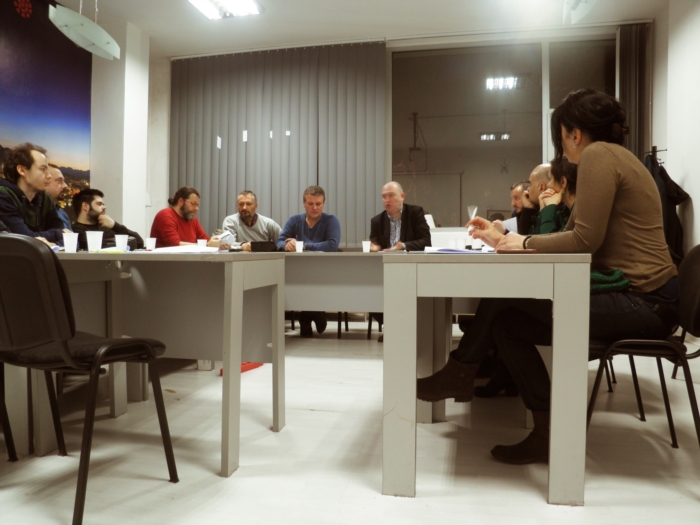
On Monday, 1st of February, 2016 in Skopje the Focus Group was held as a part of the activities planned in the ACT4CITY project. It was organized by City Creative Network (CCN), Skopje on the theme: Sustainable Cultural Practices in Skopje. The discussion was held by Erina Filipovska (CCN) with the presence of our guest, Predrag Cveticanin from The Center for Empirical Cultural Studies of Southeastern Europe, expert consultant in the ACT4CITY project. Among the attending participants in this event were representatives from the leading independent nongovernmental organizations in Skopje: Anita Ivkovik, Contemporary Art Center (CAC); Biljana Tanurovska -Kjulavkovski, Lokomotiva (Centre for New Initiatives in Arts and Culture); Ognen Marina, professor at the Faculty of Architecture, Skopje (Urban Cooks and Sinergy projects); Oliver Musovik, independent artist, Skopje (Grants and Digital Development at Balkans Arts & Culture Fund (BAC); Gligor Dubrovski, urban planner, Skopje; and Iskra Filipova and Ilcho Ilievski, students from the Faculty of Architecture, Skopje (AFS).
The main objective of the Focus Group was to present the project ACT4CITY and its regional context through the collaboration with the partners from Kotor, Belgrade, Dubrovnik and to start a debate about the topics and principles of sustainable urban development that this project promotes. In relation to this we introduce Nautilus Konstrukt as an international, collaborative and activist project of building an open stage as a new infrastructure in Skopje for promoting cultural sustainability in the city. The idea behind the Focus Group was to gather on one table, some of the Skopje’s leading independent cultural actors, to encourage a discussion and reaction about Nautilus Konstrukt and to get answers to the previously prepared questionnaire about their activities and position in link with sustainability of Skopje and sustainable urban developments in general.
The main focus of the first part of the discussion was Nautilus Konstrukt. The idea of building a new open-air stage came as a reaction to the lack of public spaces initiatives in Skopje which gives citizens, independent artists, performers and musicians an opportunity to use Nautilus as their space for performance and public gathering. The opening event was a cultural exercise that activated the stage and invigorated this neglected site of the riverbank. The opening created links between the artists and succeeded to create a strong community with a mutual goal. Therefore, the main questions were raised concerning the future development of the stage and the possibility of its use as an independent and sustainable cultural practice in Skopje.
A discussion was started and some very good ideas were given from the participants concerning this problem. They suggested to advertise Nautilus Konstrukt more using social media and to present it to all of the independent nongovernmental institutions and organizations for arts and culture. A good way to do that is to prepare a presentation with technical information about the stage concerning its dimensions and the possible ways of exploitation. Some of the participants thought that some interventions could be done for expanding the stage, e.g. including mobile platform, in order to expand the possibilities of its use. They also argued that electricity is needed on the site as a technical necessity, but also as a way to advertise the stage by lighting up the structure during nights and make it more visible for all citizens. During the conversations a point was made that stage becomes a stage only if there is an annual or seasonal program offered to the public. For that concern a serious coordination and organization is needed and can be done by opening a public call for its use where all interested performers, artists and citizens in general could apply. That way this group of people, that clearly need a space to express their work, could be the creators of all the activities at Nautilus Konstrukt. All the participants agreed that these kinds of debates are needed for exchanging ideas and experiences among the organizations that care for cultural activism and independent artistic expressions in the city of Skopje, and applauded CCN for organizing this one as a start of a long lasting collaboration in future.
The second part of the focus group was directly connected to the questionnaire about the sustainable practices in Skopje in general. The participants shared their involvement concerning their activities, their experience in collaborating with governmental institutions, the reactions they got from the citizens and gave ideas of how to promote the sustainability as an idea and practice in Skopje. All of them argued that there is lack of transparency in spending the funds for cultural events from the governmental institutions and the big gap that exists between them and the independent organizations is even growing further more. The principles of sustainability are practically nonexistent in all fields. The sustainable agenda concerning the public transport, biking through the city, the use of all green and public areas is neglected and rejected by the city institutions even though there are organizations that try to include its fundaments in the city life by protesting and trying to produce awareness about the problems. Although a law for sustainable buildings exists, it is not delivered or used in practice and is mainly broken by the government in constructing their buildings through the city.
The participants gave an idea that a campaign concerning sustainability can be created as a tool, but influencing every sector separately. One can be created for generating awareness of the city institutions, another for the private companies and a separate one for the citizens. All the neglected areas and problems could be mapped and pointed out and open call could be announced for ideas on specific issues concerning the sustainability in the city in particular fields. That way the sustainable agenda could be introduced and reach all the sectors in the community.
All the participants were very inspired, gave excellent ideas and encouraged this debate as a way of introducing the nongovernmental institutions and organizations, their fields of practice and their experience between each other. They all agreed that this collaboration is a crucial part of implementing the sustainability in Skopje, and are happy to participate in any further activities.
Public Interventions
CITY CREATIVE NETWORK (CCN) Skopje
NAUTILUS KONSTRUKT: Sustainable Cultural Practice in Skopje
Friday - Sunday, 18. - 20. September 2015, Riverbank of Vardar in front of MKC Skopje
1. What is NAUTILUS KONSTRUKT?
NAUTILUS KONSTRUKT is an international, collaborative, and activist project which takes transdisciplinary approach and links physical interventions to educational actions, artistic collaborations and community building. It is an experiment for a new infrastructure in Skopje - an open stage - for independent cultural production. This self-initiated project asks for new ways of cultural production that link the individual to the institutional and it is above all an experiment in cultural sustainability. If most of the recent cultural production in Skopje is dominated by the state through the grotesque governmental project titled Skopje 2014, then NAUTILUS KONSTRUKT is an experiment that stands in stark contrast to this as a beacon for free artistic expression which embodies the active citizen. NAUTILUS KONSTRUKT echoes and builds on the zeitgeist of the post-earthquake Skopje (1963) – an open, cosmopolitan and progressive city.
NAUTILUS KONSTRUKT takes the form of an open stage which we built by the riverbank of Vardar. It is a place for culture, one to host theatre and music performances and public gatherings of any kind. The primary idea came from the local independent theatres - Wonderland and Theatra - who needed space for performance. The stage is a reaction to the lack of public space initiatives in Skopje and gives this group and others a stage where freedom of expression is imperative. NAUTILUS brought these groups in discussion with the Youth Cultural Centre (MKC), and the City of Skopje, two major institutions that became partners in the project. The stage is built in front of MKC where despite the rich infrastructure for cultural events, lacks an outdoor stage. Although MKC is located right at the riverbank of Vardar, it doesn’t have any connection to it. MKC and NAUTILUS are in the centre of Skopje, but still in a very underdeveloped public area. This area was planned to become a cultural hub with the master plan of 1963 but this idea never materialized. Our aim is to activate this area and bring new possibilities for use along the river. NAUTILUS builds on that original plan and extends the possibilities of the riverbank, MKC, and the young artists in Skopje. The stage creates the needed connection between the street level and the river level below that has 5 meters height difference. The architecture of the stage is made of simple and durable steel frame with multifunctional wooden platforms and a staircase that is at the same time a stage and a connection to the different levels of the embankment. It is modular and easily adaptable structure to host gatherings on the both levels of the riverbanks of any kind.
NAUTILUS KONSTRUKT was built by a group of students, architects, citizens, craftsmen and artists from Macedonia and Switzerland in a period of three weeks in July 2015 in Skopje. The whole process, from idea to realisation, took a period of one year. It was realised partially as activist and partially as student project. Our NGO and the collective TEN from Zurich are the main partners in the building of the stage.
2. Opening Events With Independent Artists
The Opening Events which were part of the ACT4CITY project became a chance to connect the local artists to a group of international artists and also to propose a different - independent - way of cultural production. Since Skopje’s cultural production is dominated by the state and the state is the greatest investor in the cultural sector, it creates a monumental and mainstream tendency both in the spatial production of cultural spaces and the content of the cultural production itself which is most of the times censored.
The opening in contrast to this became the moment brought cultural content and life based on free and independent artistic expression. It became a cultural exercise that activated the stage and invigorated this neglected site of the riverbank. The opening created links between the artists and succeeded to create a strong community with a mutual goal. Over a period of three days the public in Skopje had a chance to see the stage hosting theater plays, presentations, movie screenings, dance performances, discussions, exhibitions and concerts. This underused area became a place for meeting and making a statement about alternative cultural production.
3. NAUTILUS KONSTRUKT for Cultural Sustainability
NAUTILUS KONSTRUKT proposes new ways for building cultural infrastructure that connects the independent cultural producers and artists to the institutional. A dialogue about the spatial production was opened through building of the stage that involved artists and theater groups, the city officials, the Youth Cultural Center (MKC), the Architecture Faculty from Skopje and ETH Zurich. It proposed a horizontal model for decision making and maintenance that includes many parties which are interested in expanding the possibilities of NAUTILUS. If today’s culture in Skopje is in dire need for a way out of the state dominance, then NAUTILUS KONSTRUKT, both spatially and culturally makes a strong point about the power of public space initiatives of collective and international character. Facing the challenges of financing, maintenance and program are only expected when a project of this type of organisation is realized. In NAUTILUS there is no client and no executor, there is rather a group of people who are interested in going against the mainstream in a creative and sustainable way. The stage is a public infrastructure, publicly accessible and self governed. It doesn’t make revenue but instead offers a space that can be used by any artist or citizen for their expression. It is a modern day agora, that brings life to the center of Skopje, in an area that will develop further.
4 Points for Sustainable City Development
-
Governance and Growth
NAUTILUS KONSTRUKT realizes a new governance model for utilizing public land by citizen initiatives. The project is self-initiated by a group of actors which are included in the project from the initial idea to its realization and maintenance. The City of Skopje, The Youth Cultural Center (MKC) and our group of initiators consisted of artists and architects from Skopje and abroad, made an agreement about the use of this public land by the river, and therefore created a situation of cooperation between the citizens and the institutions, something that is non-existent on the current context of urban development in Skopje. Our NGO City Creative Network initiated and moderated the discussion between the various stakeholders and partners where a horizontal model for governance and realization connected the independent actors to the institutional.
For the realisation of the project we proposed and realised a fundraising model that included many interconnected parties on local, national and international level. Our goal was to create a multifaceted realization model that includes educational and artistic practices to become part of it. We therefore became partners with the architecture faculties in Zurich and Skopje and the project became part of their curriculum. This enabled us to create a wider educational student collaboration between our NGO and the faculties. We also secured private donations by the independent artists and partners as well as support from cultural foundations such as Balkans Arts and Culture Fund (BAC), Prince Claus Fund for Culture and Development (PCF), and a fund for creative industries by the Ministry of Culture of Macedonia.
-
Environment and Natural Resources
NAUTILUS KONSTRUKT uses existing infrastructure - the riverbank of Vardar - which was built for the purpose of regulating the river from flooding and creating a green belt through the city center. The riverbank was planned to host cultural events in front of MKC, an instance that never materialized, and idea that we build upon. The stage activates the green belt along the river with new functions which are inviting the citizens to interact with the river and at the same time the stage creates a space for cultural production along the river.
-
Urban Development and Infrastructure
NAUTILUS KONSTRUKT builds new infrastructure for independent cultural production but also connects to the existing infrastructure of the Youth Cultural Center (MKC) and extends its activities along the river. NAUTILUS proposes a new model for urban development that is self-initiated by a group of interested parties and realised independently but including the local city authorities. The project ACT4CITY became a part of the opening of NAUTILUS KONSTRUKT that connected local and international independent artists and expanded the list of stakeholders that participate in the project.
-
Society and Community
NAUTILUS KONSTRUKT is a case-study for empowering the individual cultural producers and citizens, therefore promoting a greater awareness and possibilities for participation in the processes that shape our cities. It creates a strong community of active citizens and independent artists that use creative means to challenge the mainstream cultural production and city development. The horizontal system of realization, where every participant is part of the network, created a strong sense of community. This community included artists and architects but more importantly citizens, governmental officials, institutions, students, craftsmen, NGO’s both local and international.
Kickoff meeting
ACT4CITY: Independent cultural actors towards sustainable Balkan cities
Belgrade, 04. - 05.06.2015 at MikroArt (Ministry of space)
Attendees:
- Tatjana Rajić - Expeditio, Kotor
- Dobrica Veselinivić, Marko Aksentijević, Radomir Lazović - Ministarstvo prostora, Belgrade
- Milan Dinevski - City Creative Network (CCN), Skopje
- Srdjana Cvijetić - Art workshop Lazareti, Dubrovnik
- Oliver Musovik - BAC (Balkans Arts & Cultur Fund)
Project description
ACT4CITY: Independent cultural actors towards sustainable Balkan cities
Acting for urban development, particularly by contributing to citizens’ empowerment, requires a new level of skills for cultural and creative actors. This has been recognized at the European level and applies also to the Balkan region. Artistic activities in the Balkan countries are still dominantly practiced through traditional methods, rather than trans-disciplinary experimentations. Given that urban environment is a space for everyday life for the majority of people, there is a growing need to empower independent cultural actors to focus more on urban sustainability approach. However, experimentation and awareness-raising in the local context is crucial for influencing political stakeholders to take into account the creative sector as a relevant partner in promoting urban sustainability.
A sustainable city concept focuses on improving the quality of life in a city, including ecological, cultural, political, institutional, social and economic components, without leaving a burden to future generations. Key features of a sustainable city are: Resources and services are accessible to all;Public transport is seen as a viable alternative to cars (it is safe and reliable); Walking and cycling is safe; Open public spaces are safe, accessible and enjoyable; Renewable resources are used; Waste is seen as a resource and is recycled wherever possible; New homes are energy efficient; There is access to affordable housing; Community links are strong; Cultural and social amenities are accessible to all.
Main goal of the project ACT4CITY is to promote sustainable city approach through joint educational, artistic and advocacy actions implemented by independent cultural actors from Montenegro, Macedonia, Serbia and Croatia.
Planned activities: Research on the role of creative sector in co-designing sustainable Balkan cities, through organizing focus groups in each partner’s country; Joint discussions/round tables for stakeholders on trans-disciplinary engagement of independent cultural actors in the issues regarding the Balkan cities sustainability; Public interventions in Montenegro, Macedonia, Serbia and Croatia aiming to link artistic/creative actions and sustainable cities concept; Regional workshop for independent cultural actors from partner countries who wish to be actively engaged in co-designing of Balkan sustainable cities; PR and visibility tools; Joint political recommendations for improving the creative sector’s participation in co-designing sustainable Balkan cities.
Partners:
- EXPEDITIO Kotor, Montenegro
- MikroArt (collective: Ministarstvo prostora - Ministry of Space), Belgrad, Serbia
- City Creative Network (CCN) Skopje, Macedonia
- Art radionica Lazareti - Art Workshop Lazareti, Dubrovnik, Croatia
Start Date: 01/09/2015 End Date: 01/06/2017
*ACT4CITY is funded by Balkan Arts and Culture Fund BAC. BAC is supported by the Swiss Government through the Swiss Agency for Development and Cooperation (SDC) and the European Cultural Foundation (EFC)
-----------------------------------------------------------------------------------------
BAC - Balkans Arts & Culture Fund
link of the news
EXPEDITIO / Kotor
Ministarstvo prostora / Belgrade
art radionica lazareti # art workshop lazareti / Dubrovnik


